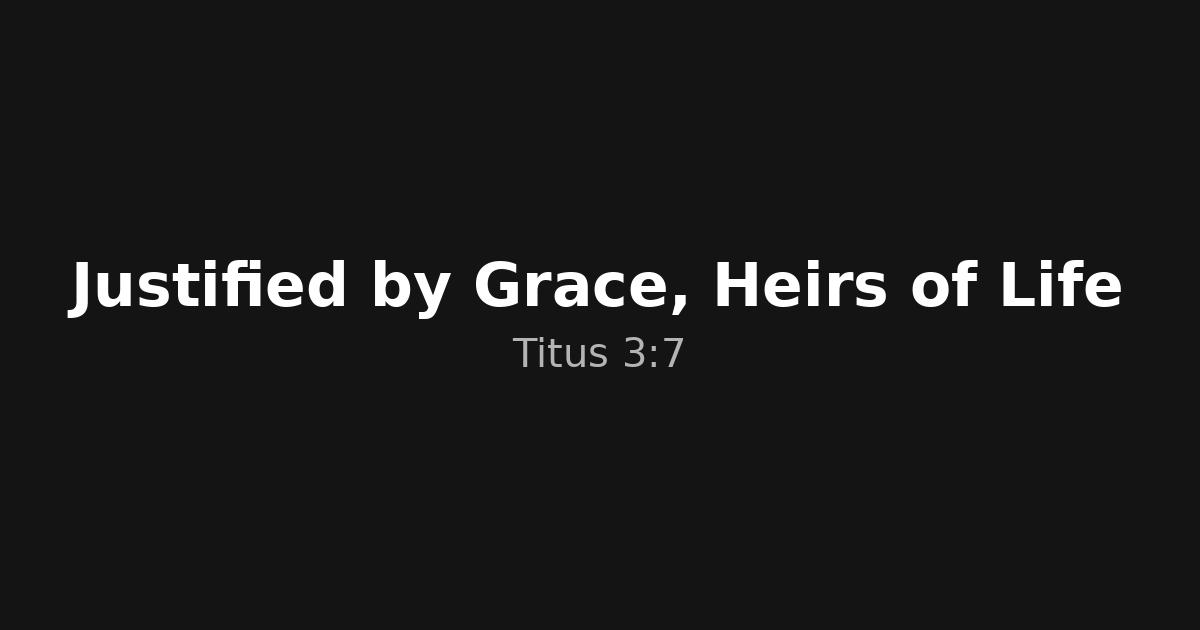“that having been justified by His grace we should become heirs according to the hope of eternal life.” — Titus 3:7
This powerful verse doesn’t stand alone—it flows directly from one of the clearest presentations of the gospel in Paul’s pastoral epistles. To fully grasp the weight of Titus 3:7, we must look at what comes before it:
“For we ourselves were also once foolish, disobedient, deceived, serving various lusts and pleasures, living in malice and envy, hateful and hating one another.”
“But when the kindness and the love of God our Savior toward man appeared,”
“not by works of righteousness which we have done, but according to His mercy He saved us, through the washing of regeneration and renewing of the Holy Spirit,”
“whom He poured out on us abundantly through Jesus Christ our Savior,”— Titus 3:3–6
From Ruin to Redemption
Paul reminds us of what we once were—completely lost. Not just imperfect people making mistakes, but spiritually dead in disobedience and deception. Slaves to sin, filled with envy, and far from God. But then, in one of the most hope-filled transitions in all of Scripture, Paul writes:
“But when the kindness and love of God our Savior appeared…”
God didn’t save us because we cleaned ourselves up. He didn’t wait for us to prove ourselves. He saved us out of sheer mercy. It wasn’t “by works of righteousness” (v.5). It was His mercy, expressed through regeneration and renewal by the Holy Spirit—a complete transformation from the inside out.
Justified by Grace
Then we arrive at verse 7:
“that having been justified by His grace…”
Justification is a legal term. It means to be declared righteous before God. This declaration doesn’t come through effort, obedience, or law-keeping. It comes by grace—God’s unmerited favor, poured out because of what Christ accomplished on the cross.
This aligns perfectly with Paul’s message in Romans 3:24:
“being justified freely by His grace through the redemption that is in Christ Jesus.”
Heirs According to the Hope of Eternal Life
But justification isn’t the end of the story—it’s the beginning of a new one. Once justified, we become heirs. That means full adoption into God’s family with a guaranteed inheritance. What is that inheritance?
“according to the hope of eternal life.”
Eternal life is not just quantity—it’s quality. It’s not just living forever, but living forever with God, in perfect righteousness and joy. And this “hope” isn’t a wish—it’s a confident expectation because it’s based on the promises of a faithful God.
Paul uses the same phrase in Titus 1:2:
“in hope of eternal life which God, who cannot lie, promised before time began.”
Takeaway for the Believer Today
If you’ve trusted in the finished work of Christ—His death for your sins, His burial, and His resurrection—you are justified by grace. You are no longer under wrath, no longer an outsider, no longer a slave to sin. You are an heir, and your inheritance is eternal life in glory.
Don’t let the world—or religion—confuse you. You are saved not by works, but by grace. And the life you now live is rooted in a sure hope, not in constant striving or fearful doubt.
Are You Walking in the Confidence of Grace?
The world needs more believers who rest in the finished work of Christ—who walk in the calm assurance of justification and the joy of their inheritance. This isn’t arrogance; it’s faith.
Let this truth sink in:
- You are justified.
- You are an heir.
- You have the hope of eternal life—because God said so.
“Therefore, having been justified by faith, we have peace with God through our Lord Jesus Christ.”
— Romans 5:1

0 Comments